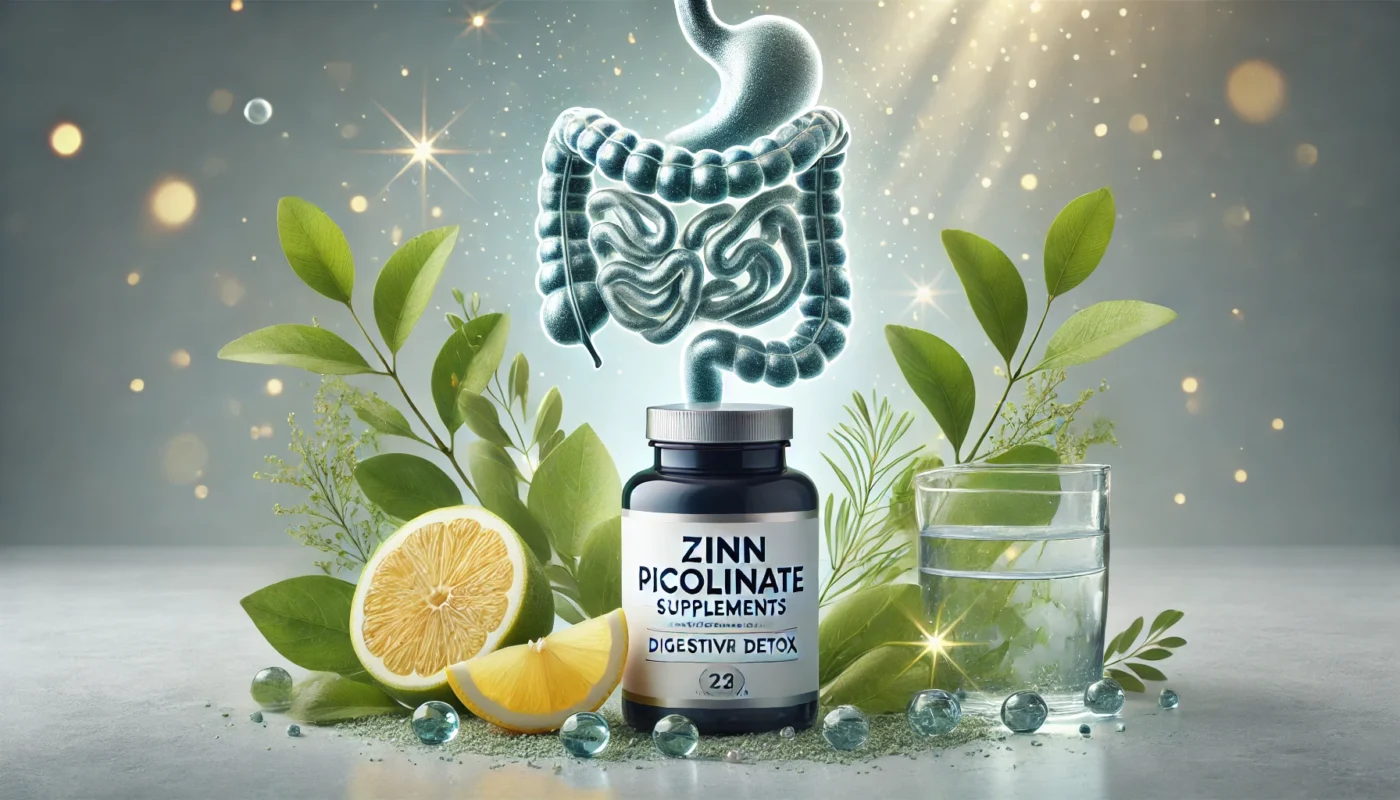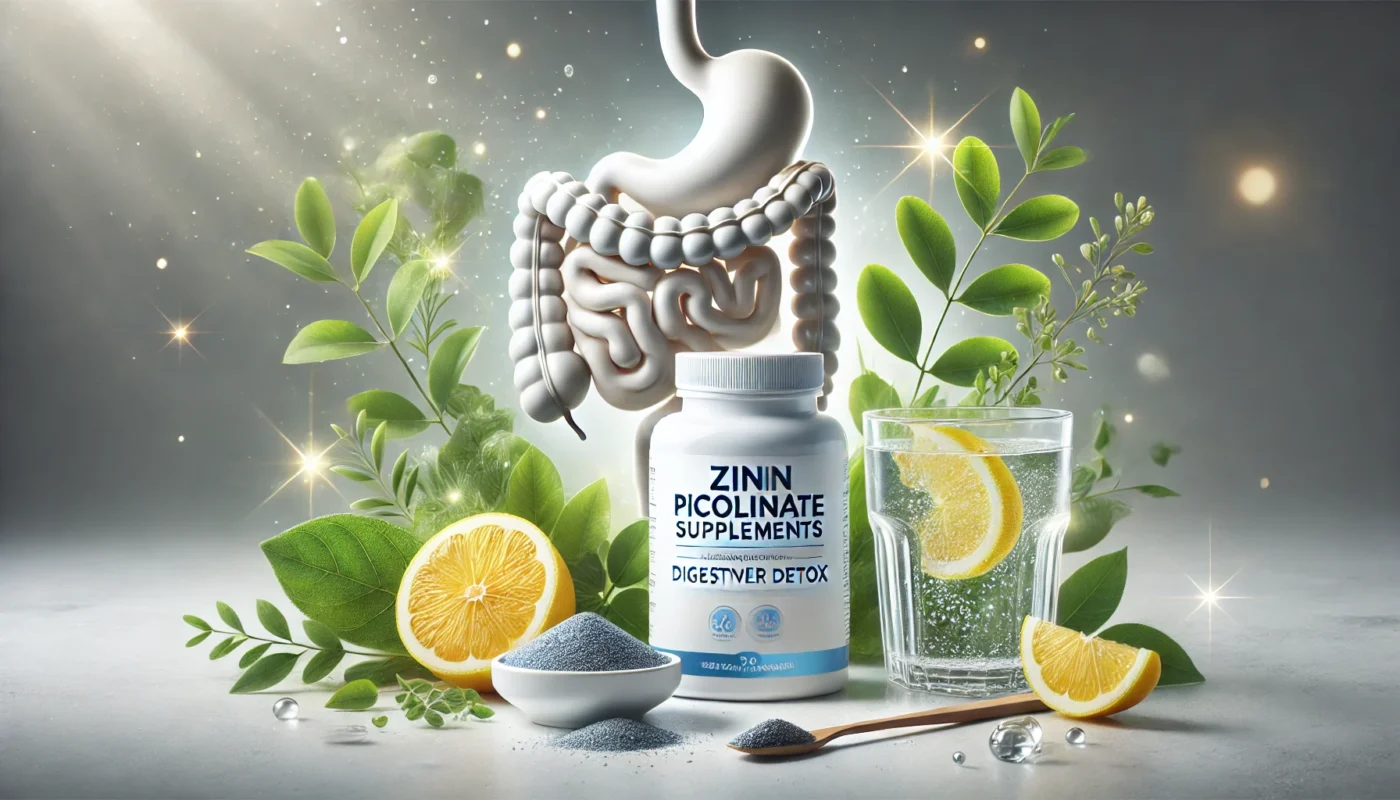The digestive system is the body’s first line of defense against harmful toxins, pathogens, and waste products. However, exposure to environmental pollutants, processed foods, and medications can overwhelm this system, leading to toxin buildup, inflammation, and compromised gut health. Regular detoxification is essential for maintaining optimal digestive function and overall well-being.
Zinc, a vital trace mineral, plays an integral role in supporting the body’s natural detoxification pathways. It is critical for maintaining intestinal barrier integrity, neutralizing toxins, and promoting a healthy gut microbiome. Zinc picolinate, a highly bioavailable form of zinc, ensures effective absorption and utilization, making it a powerful ally in digestive detoxification. This article explores how zinc picolinate helps clear toxins from the digestive system, supported by scientific evidence and clinical insights.
You May Also Like:
Zinc Picolinate for Preventing Gestational Diabetes: The Science You Need to Know
Zinc Picolinate for Vaginal Dryness Relief: Here’s What to Know
Zinc Picolinate for Digestive Detox: Clearing the Path is an original (HSLHealing) article.
The Digestive System’s Role in Detoxification
The digestive system is responsible for breaking down food, absorbing nutrients, and eliminating waste. Key organs and processes involved in detoxification include:
- Stomach:
Produces acid to break down food and kill harmful pathogens. - Liver:
Processes toxins and converts them into water-soluble compounds for excretion. - Small Intestine:
Absorbs nutrients while keeping harmful substances out of the bloodstream. - Large Intestine:
Eliminates waste and supports beneficial bacteria that neutralize toxins. - Gut-Associated Lymphoid Tissue (GALT):
Provides immune defense by identifying and eliminating harmful substances.
When this system is compromised, toxins can accumulate, leading to symptoms like bloating, fatigue, and inflammation. Zinc picolinate offers multiple benefits to support and enhance digestive detoxification.
The Role of Zinc in Digestive Detoxification
Zinc is essential for various processes that protect and detoxify the digestive system:
- Supporting Enzymatic Reactions:
Zinc is a cofactor for enzymes like metallothionein and superoxide dismutase (SOD), which neutralize toxins and free radicals. - Maintaining Gut Barrier Integrity:
Zinc strengthens tight junctions in the intestinal lining, preventing toxins from leaking into the bloodstream. - Regulating Gut Microbiota:
Zinc promotes the growth of beneficial bacteria while inhibiting harmful pathogens. - Reducing Inflammation:
Zinc modulates inflammatory pathways, protecting the gut from toxin-induced damage. - Enhancing Immune Function:
Zinc supports immune cells in identifying and eliminating harmful substances in the gut.

What Is Zinc Picolinate?
Zinc picolinate is a chelated form of zinc, where zinc is bound to picolinic acid. This structure enhances zinc’s absorption in the gastrointestinal tract, making it one of the most bioavailable forms of zinc supplementation. For individuals seeking to detoxify their digestive system, zinc picolinate ensures efficient delivery of zinc to the cells and tissues where it is most needed.
How Zinc Picolinate Aids Digestive Detoxification
1. Strengthening the Intestinal Barrier
The intestinal lining serves as a critical barrier, allowing nutrients to pass through while blocking toxins and harmful pathogens. Zinc picolinate supports tight junction proteins that maintain this barrier, reducing the risk of “leaky gut.”
- Study Insight: A study in Gut found that zinc supplementation reduced intestinal permeability by 25% in individuals with inflammatory bowel conditions, improving their ability to detoxify harmful substances.
2. Neutralizing Free Radicals
Toxins and environmental pollutants generate free radicals, which can damage cells and tissues in the digestive system. Zinc picolinate enhances the activity of antioxidant enzymes like SOD, which neutralize these harmful molecules.
- Research Finding: A study in Free Radical Biology and Medicine demonstrated that zinc increased antioxidant enzyme activity by 30%, reducing oxidative damage in gut tissues.
3. Regulating Gut Microbiota
A healthy gut microbiome is essential for detoxification, as beneficial bacteria help break down toxins and support immune function. Zinc picolinate promotes the growth of beneficial bacteria like Lactobacillus and Bifidobacterium.
- Evidence: Research in Microbial Ecology in Health and Disease found that zinc supplementation increased beneficial bacterial populations by 20%, improving gut health and toxin clearance.
4. Supporting Liver Detoxification
The liver is a key organ in detoxification, processing toxins from the digestive tract and converting them into excretable forms. Zinc is vital for liver enzyme function and bile production, which aid in toxin elimination.
- Clinical Evidence: A study in Hepatology found that zinc supplementation improved liver function by 18%, enhancing its ability to process and excrete toxins.
5. Reducing Gut Inflammation
Toxins can trigger inflammation in the gut, impairing its detoxification capacity. Zinc picolinate modulates inflammatory cytokines, protecting the gut lining and promoting a healthy environment.
- Study Insight: Research in Nutrients showed that zinc supplementation reduced levels of pro-inflammatory markers like interleukin-6 (IL-6) and tumor necrosis factor-alpha (TNF-α) by 25%, improving gut resilience.
6. Enhancing Waste Elimination
Zinc supports enzymes involved in breaking down food and toxins, ensuring efficient waste elimination through the colon. It also helps prevent constipation, a common barrier to detoxification.
- Evidence: A study in Digestive Diseases and Sciences found that zinc improved colonic motility and waste elimination, reducing toxin buildup in the gut.

Zinc Deficiency and Digestive Health
Zinc deficiency can compromise digestive detoxification, leading to symptoms such as:
- Increased Intestinal Permeability:
A weak gut barrier allows toxins to enter the bloodstream, causing systemic inflammation. - Imbalanced Microbiota:
Zinc deficiency disrupts the balance of gut bacteria, allowing harmful pathogens to thrive. - Reduced Enzyme Activity:
Low zinc levels impair the function of detoxifying enzymes like metallothionein and SOD. - Chronic Inflammation:
Zinc deficiency exacerbates gut inflammation, delaying recovery and detoxification.
Statistics:
- According to a study in The Lancet, 17% of the global population is at risk of zinc deficiency, particularly in individuals with digestive disorders or poor diets.
Dietary Sources of Zinc
In addition to supplementation, consuming zinc-rich foods can support digestive detoxification. Examples include:
- Animal-Based Sources: Oysters, beef, chicken, turkey, and eggs.
- Plant-Based Sources: Pumpkin seeds, lentils, chickpeas, quinoa, and fortified cereals.
For individuals with dietary restrictions or absorption issues, zinc picolinate offers a reliable and efficient alternative.

Recommended Dosage and Safety
The recommended dietary allowance (RDA) for zinc is:
- Men: 11 mg/day
- Women: 8 mg/day
For digestive detoxification, therapeutic doses of zinc picolinate typically range from 15–30 mg/day. Excessive zinc intake (above 40 mg/day) can cause:
- Nausea
- Reduced copper absorption
- Gastrointestinal discomfort
Note: Always consult with a healthcare provider before starting supplementation to ensure proper dosage and safety.
Integrating Zinc Picolinate into a Detox Routine
- Pair with Probiotics: Combining zinc picolinate with probiotics supports microbiome balance and toxin elimination.
- Hydrate Adequately: Proper hydration aids in flushing out toxins from the digestive system.
- Adopt a Fiber-Rich Diet: Fiber binds to toxins in the gut, enhancing their elimination.
- Monitor Symptoms: Track improvements in bloating, energy, and gut health after starting supplementation.
Who Can Benefit from Zinc Picolinate for Digestive Detox?
- Individuals with Gut Disorders: Zinc supports healing and detoxification in conditions like leaky gut and IBS.
- Those Exposed to Environmental Toxins: Zinc enhances the body’s ability to neutralize and eliminate pollutants.
- People on High-Processed Diets: Zinc helps mitigate the effects of food additives and preservatives.
- Athletes and Active Individuals: Zinc supports recovery and detoxification from oxidative stress caused by intense exercise.
Future Research Directions
While existing studies highlight zinc picolinate’s benefits for digestive detoxification, further research could explore:
- Its synergistic effects with other detox-supporting nutrients like magnesium and glutathione.
- Long-term impacts on chronic digestive disorders.
- Zinc’s role in reducing systemic inflammation caused by gut-derived toxins.
Conclusion: Zinc Picolinate for Digestive Detox
Zinc picolinate offers a powerful, evidence-based solution for supporting digestive detoxification. By strengthening the gut barrier, regulating microbiota, and reducing inflammation, it addresses the root causes of toxin buildup and compromised gut health.
For individuals seeking to enhance their digestive health and overall well-being, incorporating zinc picolinate into their routine provides significant benefits. As always, consult with a healthcare provider to tailor supplementation to your specific needs and ensure safe and effective use.

References
- New Insights into the Role of Trace Elements in IBD. Retrieved from: https://pmc.ncbi.nlm.nih.gov/articles/PMC6146599/
- Zinc and Oxidative Stress: Current Mechanisms. Retrieved from: https://pmc.ncbi.nlm.nih.gov/articles/PMC5488004/
- Zinc and gastrointestinal disease. Retrieved from: https://pmc.ncbi.nlm.nih.gov/articles/PMC4231515/
- Tumor necrosis factor-alpha (TNF-alpha) and interleukin-6 (IL-6) in B-lymphocyte function. Retrieved from: https://pubmed.ncbi.nlm.nih.gov/8990098/
- Role of Zinc in Immune System and Anti-Cancer Defense Mechanisms. Retrieved from: https://pmc.ncbi.nlm.nih.gov/articles/PMC6835436/
- Zinc and gut microbiota in health and gastrointestinal disease. Retrieved from: https://pmc.ncbi.nlm.nih.gov/articles/PMC9082519/
- Effect of zinc supplementation on intestinal permeability in experimental colitis. Retrieved from: https://www.sciencedirect.com/science/article/abs/pii/S0022214302044177
- Zinc Metabolism and Metallothioneins. Retrieved from: https://pubmed.ncbi.nlm.nih.gov/28812260/
Important Note: The information contained in this article is for general informational purposes only, and should not be construed as health or medical advice, nor is it intended to diagnose, prevent, treat, or cure any disease or health condition. Before embarking on any diet, fitness regimen, or program of nutritional supplementation, it is advisable to consult your healthcare professional in order to determine its safety and probable efficacy in terms of your individual state of health.
Regarding Nutritional Supplements Or Other Non-Prescription Health Products: If any nutritional supplements or other non-prescription health products are mentioned in the foregoing article, any claims or statements made about them have not been evaluated by the U.S. Food and Drug Administration, and such nutritional supplements or other health products are not intended to diagnose, treat, cure, or prevent any disease.

